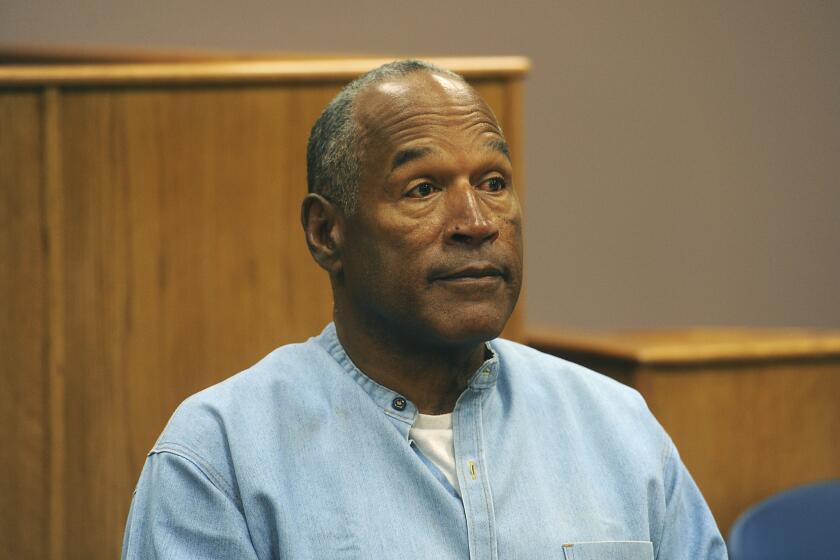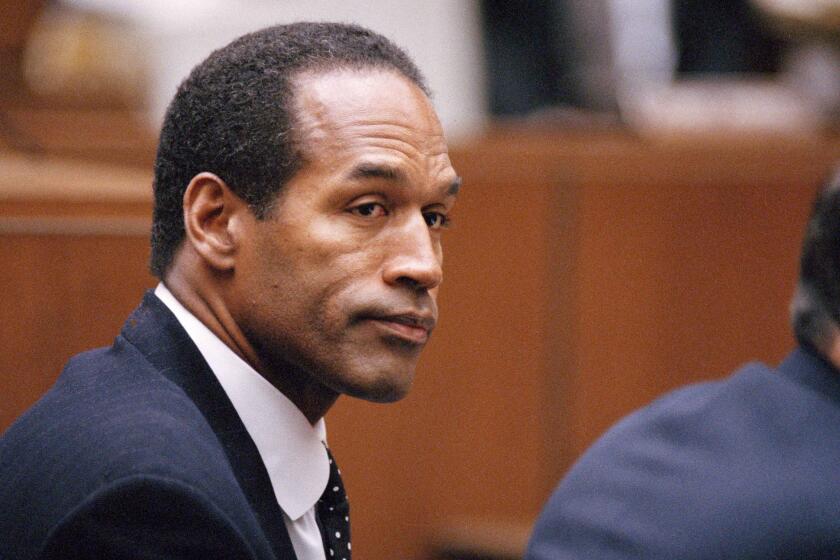O.J. Simpson’s trial cast a long shadow on the LAPD — but brought few changes

When the double murder trial of O.J. Simpson ended with a stunning not-guilty verdict, the TV camera in the Los Angeles courtroom focused on the former football star and actor, who pursed his lips and mouthed “thank you” to the jury.
But after Simpson walked free, despite evidence that indicated he was behind the slayings of his ex-wife Nicole Brown Simpson and her friend Ron Goldman, the focus fell on another central figure in the case: the Los Angeles Police Department.
Some pinned the outcome on clever lawyering; others on the still-raw memories of the Rodney King verdict — but in many ways, the case was as much about the LAPD’s reputation as it was about Simpson’s guilt or innocence.
Simpson died Thursday at 76, reviving memories of how his case roiled the LAPD, raising issues of corruption, racism and incompetence that still resonate nearly three decades later.
Many from the sporting world took to social media to express their feelings toward former football star and accused murderer O.J. Simpson, who has died of cancer at 76.
Almost from the start, Simpson’s “dream team” of high-priced attorneys set its sights on the LAPD. At points throughout the trial, which turned into a worldwide media spectacle with 126 witnesses and 35 weeks of evidence and testimony, the defense took turns questioning the competency of police crime-lab technicians, West L.A. Division officers and the vaunted Robbery-Homicide Division.
In the days after the verdict, The Times wrote that “no part of the criminal justice establishment took a more punishing beating” during the trial than the LAPD, “whose officers and technicians were charged at various times with bigotry, deceit, ignorance and garden-variety incompetence.”
The defense played for the jury tapes of the prosecution’s star witness, LAPD homicide detective Mark Fuhrman, casually using the N-word while describing tales of police delivering beatings, falsifying arrests, planting evidence and generally singling out minorities for harsh and brutal treatment.
In response to the Fuhrman tapes, the department and the Police Commission launched internal investigations into the events described, and leaders pledged a renewed effort to weed out what critics described as the casual racism in the department. The LAPD also pushed for funding to proceed with improvements to its troubled crime lab.
Yet after the verdict, Willie Williams, the chief at the time, struck a defensive tone, according to reports, saying the LAPD was no more afflicted with racism than any other large diverse, organization. Williams called the trial “devastating” for department employees who “had to listen to so much and be blamed.”
In a lot ways, many of us remain locked in our bubbles, not entirely understanding the thought processes of people of other races and ethnicities.
For the LAPD, the case was a reminder of a period that leaders would rather forget. That sentiment was reflected in the brief statement the department released hours after Simpson’s death was announced: “Interactions between O.J. Simpson and the Los Angeles Police Department are well documented. In his passing, there is nothing for the Department to add to this narrative.”
How much really changed after the Simpson trial remains a matter of intense debate among LAPD historians. Some argue that it took years for reform to come, and then only in response to a federal consent decree that followed the Rampart corruption scandal.
In more ways than one, the Simpson trial laid bare an uncomfortable truth about the LAPD’s history of brutality and cover-ups against the Black community that some white Angelenos were still questioning even four years after King’s beating, according to former Councilmember Zev Yaroslavsky. The Simpson verdict stood as a Rorschach test for views on race and policing, he said.
“It was not preposterous, from a jury’s point of view, that some of these defense arguments had some credibility,” Yaroslavsky said.
The LAPD’s fingerprints were all over the case in other ways.
The gun Simpson clutched during his infamous white Bronco chase was registered to then-LAPD Lt. Earl Paysinger, who worked security for the owner of the Los Angeles Raiders and would go on to become assistant chief.
L.A. County Superior Court Judge Lance Ito, who presided over the trial, was married to Margaret “Peggy” York, who rose through the LAPD to become its first woman deputy chief.
Simpson had a cozy relationship with officers from the nearby police station, whom he frequently invited to his house in Brentwood for barbecues and pool parties. Some cops who worked in that division were star-struck by Simpson, occasionally asking for his autograph even as they were repeatedly called to his house for domestic disturbances.
“LAPD at that time was probably at its lowest, just on the heels of Rodney King,” said Laurie Levenson, a professor at Loyola Law School in Los Angeles and a former federal prosecutor. “There wasn’t a lot of professionalism.”
O.J. Simpson’s murder trial followed fast on the heels of devastating civil unrest and a deadly earthquake — a time when Los Angeles was so used to reeling it became a state of mind.
While the King and Rampart scandals led to numerous studies and blue-ribbon commissions aimed at changing the way the LAPD polices the city, Simpson’s trial was “treated as a celebrity case,” she said.
Levenson said that though it remains a work in progress, the LAPD has reformed itself significantly since the trial.
Civil rights attorney Carl Douglas, who was a part of Simpson’s defense team, said LAPD leaders often struck a defensive tone in the weeks after the verdict, a familiar circling of the wagons in the face of criticism from outsiders after previous controversial and racist incidents.
“Everyone knew that Mark Fuhrman was a potential powder keg,” Douglas said. “The zeal with which they wanted to convict O.J. Simpson in the face of many high-profile losses the department had suffered certainly caused them to ignore the problems.”
The case’s most enduring legacy, he said, was in changes to the department’s rules on evidence collection and storage — advancements that might have helped avoid the embarrassing admission at trial that a detective walked out of LAPD headquarters with a vial of Simpson’s blood in his pocket. The case also helped usher in the age of DNA testing.
Former LAPD chief Bernard Parks, an assistant chief at the time, remembers it from the other side of the divide. Whatever “self-inflicted wounds” emerged during the trial, from the mishandling of evidence to the disclosure of the Fuhrman tapes, were the result of individual failures, not deeper problems within the department, he said.
“Procedures were in place; people just didn’t follow them,” Parks said. “In my judgment, Fuhrman should’ve never been in a position to embarrass the department. People knew full well what his background was.”
Bill Scott had just made detective after about six years with the LAPD when the Simpson verdict was announced. Looking back, Scott said the case was another reminder of the racial tensions that have flared up throughout the department’s history.
O.J. Simpson’s death brings back memories of chronicling the scenes surrounding the murder of Nicole Brown Simpson and Ron Goldman, and the Trial of the Century.
“It raised the awareness of … the intersection of race, the criminal justice system, money, wealth,” said Scott, now the chief of police in San Francisco. But he said he wouldn’t call it a watershed moment in the department’s history, on par with the King case.
For some reflecting on the verdict, the issues that bubbled to the surface remain relevant.
Tim Kornegay, director of Livefree California, a crime intervention and advocacy coalition, recalled how the argument that Simpson — despite his wealth and the way he had distanced himself from Black causes — was railroaded by the LAPD resonated with “regular Black dudes on the street that have been dealing with this forever.”
When the trial shifted from evidence of Simpson’s guilt to the actions of the LAPD, Kornegay said, many people began to asking themselves: “How can you embrace this mountain of evidence from this group of people that historically have been doing all these types of things to Black people?”
More to Read
Sign up for Essential California
The most important California stories and recommendations in your inbox every morning.
You may occasionally receive promotional content from the Los Angeles Times.















